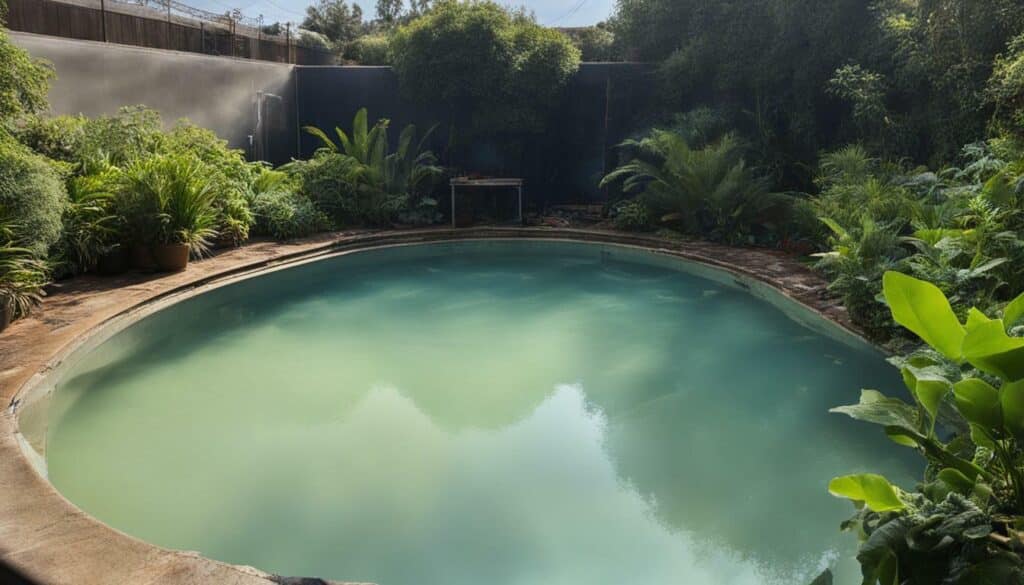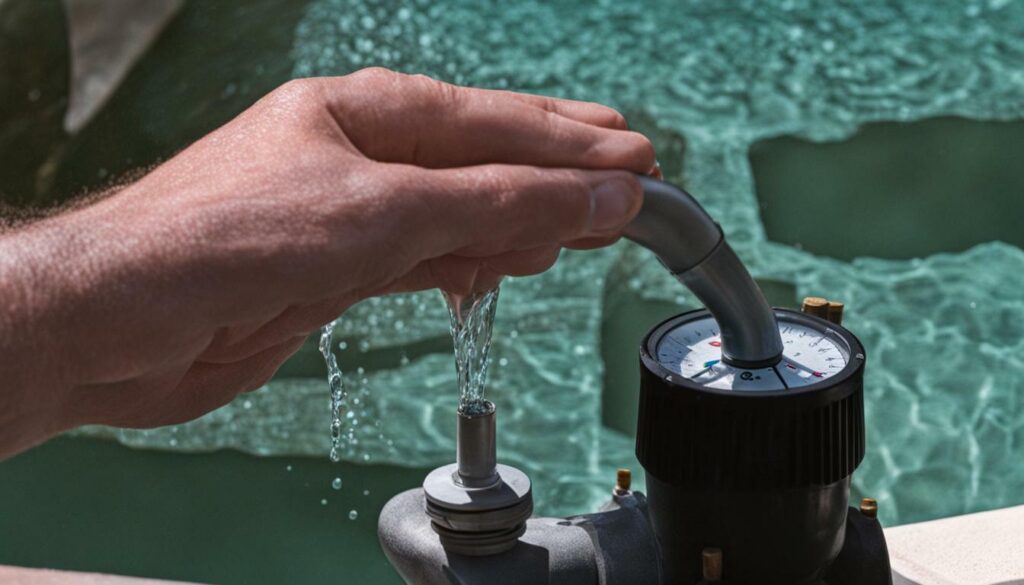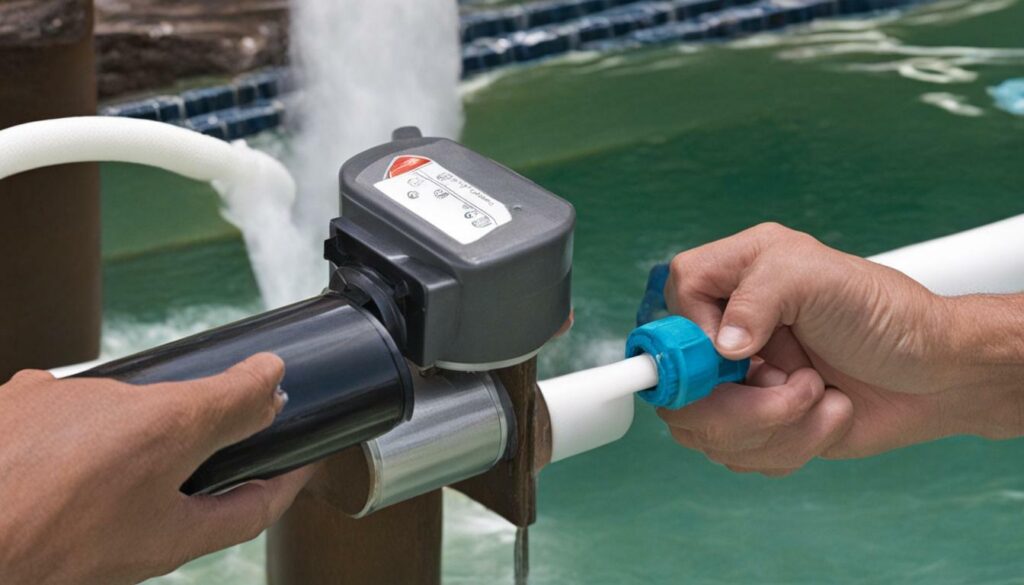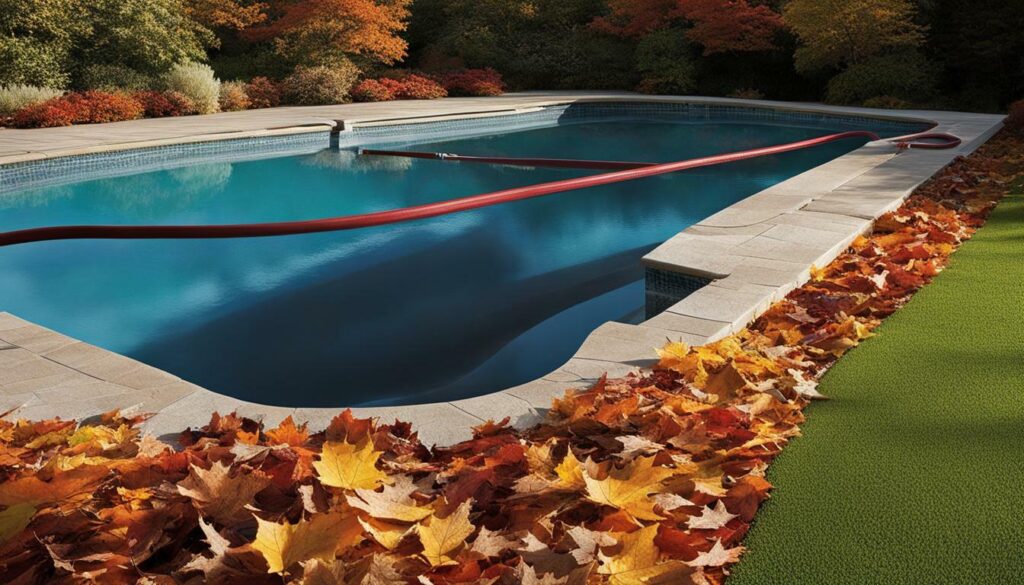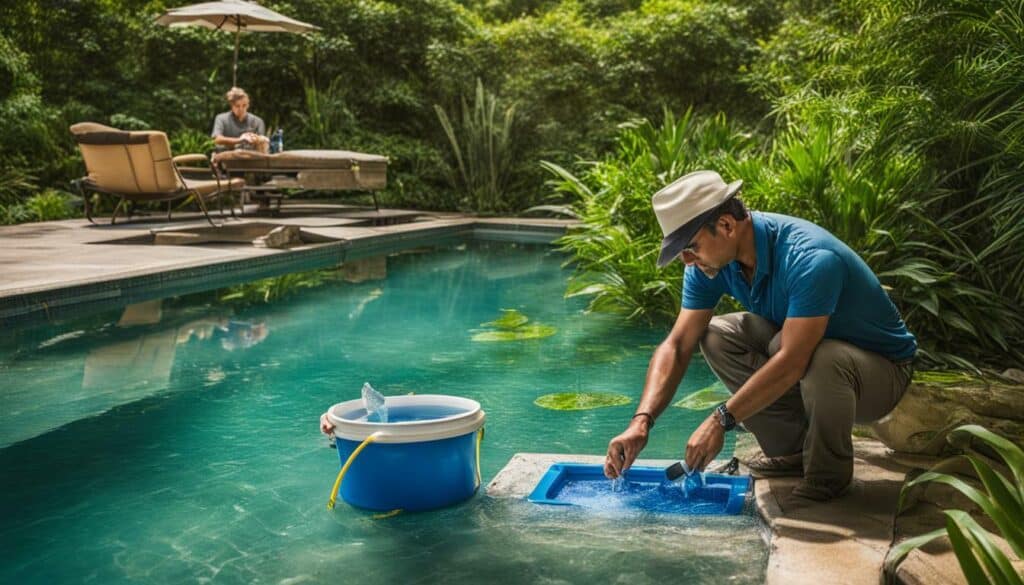
Swimming in a saltwater pool can be a refreshing and enjoyable experience, but in order to keep the water safe and sanitary, it’s important to properly maintain the pool. By following a few simple steps, you can ensure that your saltwater pool stays clean and clear all season long.
- Proper maintenance is essential for a clean and safe saltwater pool.
- Regular cleaning, chemical balancing, and filtration maintenance are all important tasks.
- The right equipment and troubleshooting techniques can help you address common pool issues.
- Seasonal maintenance is necessary to keep your pool in top condition.
- With consistency and the right tools, maintaining a saltwater pool can be a manageable task.
Understanding Saltwater Pool Care
If you’re new to owning a saltwater pool, it’s important to understand the basics of saltwater pool care. While it’s similar to maintaining a traditional chlorine pool, there are some key differences to keep in mind.
Benefits of a Saltwater Pool: Saltwater pools are popular because they provide a gentler and more natural swimming experience. The saltwater is easier on the skin and eyes, and it doesn’t have the harsh chemical odor associated with traditional pools.
Differences from Chlorine Pools: While both types of pools require regular cleaning and maintenance, saltwater pools use a chlorine generator to produce chlorine from saltwater. This means you won’t have to store or handle chlorine chemicals, and it also results in lower chlorine levels in the water.
When it comes to saltwater pool care, there are a few key factors to keep in mind:
- Water Balance: It’s important to test the water regularly to ensure the pH, alkalinity, and calcium levels are balanced. This will prevent scaling, corrosion, and other issues.
- Cleaning: Regular cleaning is crucial to keep the pool free of debris and prevent algae growth. You’ll need to brush and vacuum the pool regularly and skim the surface daily.
- Filtration: The filtration system plays a vital role in maintaining water clarity and preventing algae growth. Be sure to clean the filter regularly and troubleshoot any issues that arise.
- Chemicals: While you won’t need to add chlorine directly, you’ll still need to add other chemicals as needed to balance the water chemistry. This may include stabilizer, algaecide, and shock.
With these factors in mind, you can properly care for your saltwater pool and enjoy a crystal-clear swimming experience.
The Importance of Regular Cleaning
Keeping your saltwater pool clean is essential for maintaining a safe and enjoyable swimming experience. Unlike traditional chlorine pools, saltwater pools require less maintenance, but that doesn’t mean you can neglect cleaning entirely.
One of the first steps in maintaining a clean saltwater pool is to remove debris from the water. Skim the surface of the pool regularly, ideally every day, to remove any leaves, insects, or other debris that may have fallen into the pool. It’s also important to clean the pool’s walls and floor to prevent the buildup of algae and other harmful bacteria.
Using a pool brush, scrub the pool’s walls and floor, paying special attention to areas that are prone to algae growth, such as shaded areas or corners. You can also use a pool vacuum to remove any dirt or debris that may have settled on the pool floor.
Another important aspect of saltwater pool cleaning is maintaining proper water chemistry. Test the water regularly to ensure the pH, chlorine, and salt levels are within the recommended range. Keeping these levels in check will prevent the growth of harmful bacteria and maintain water clarity.
By regularly cleaning your saltwater pool, you’ll not only ensure a clean and safe swimming experience, but you’ll also prolong the life of your pool equipment and save money on maintenance costs in the long run.

Properly balancing the chemicals in a saltwater pool is critical for maintaining a healthy environment for swimmers. The ideal saltwater pool water balance ensures that the pool water is crystal clear, free of bacteria and algae, and comfortable to swim in. The following are the necessary chemicals and their ideal levels for maintaining a healthy saltwater pool:
| Chemical | Ideal Range |
|---|---|
| Free Chlorine | 1-3 ppm (parts per million) |
| pH | 7.2-7.8 |
| Total Alkalinity | 80-120 ppm |
| Calcium Hardness | 200-400 ppm |
| Cyanuric Acid | 30-50 ppm |
Regularly test the water levels of your saltwater pool with a reliable pool test kit. To increase or decrease the levels of these chemicals, use the necessary chemical additives explicitly designed for saltwater pools. Avoid adding too many chemicals at once, and wait at least four hours between adding different chemicals to allow enough time for them to dissolve and mix thoroughly.
Remember that maintaining proper saltwater pool water balance is an ongoing process. Daily or weekly testing and adjustment of chemical levels as needed will keep your saltwater pool in excellent condition for swimming and enjoyment.

Proper filtration is crucial for keeping your saltwater pool clean and clear, and it starts with the pump and filter system. Make sure to run your pump for at least eight hours a day, and replace the filter cartridge or backwash the sand filter every six months.
You should also regularly check and clean the skimmer basket and pump strainer basket to prevent debris from clogging the filtration system. If you notice the water flow is reduced or there are air bubbles in the pump basket, it could indicate a leak or clog in the system that needs to be addressed.
In addition to the pump and filter, you can also use supplemental filtration systems, such as a robotic pool cleaner or a UV light system, to improve the water quality and reduce the workload on the main system.
If you do encounter issues with your filtration system, such as a clogged pump or a broken filter, it’s important to address them promptly before they lead to larger problems.
| Tip | Description |
|---|---|
| Test pool water regularly | Testing the chemical levels of your pool water can help you identify any imbalances that can cause filtration issues. |
| Keep the pool deck clean | Debris and dirt on the pool deck can easily find its way into the water and clog the filtration system. |
| Invest in a quality filter | A high-quality filter can make a big difference in the efficiency and effectiveness of your filtration system. |
By staying on top of your filtration system maintenance and using supplemental filtration methods, you can ensure that your saltwater pool stays clean, clear, and refreshing throughout the swimming season.

Proper maintenance of a saltwater pool requires the right equipment. From routine tasks to troubleshooting issues, having the right tools on hand can make all the difference. Here are some essential pieces of equipment every saltwater pool owner should have:
| Equipment | Function |
|---|---|
| Skimmer | To remove debris from the pool surface. |
| Pool Brush | To brush the walls and floor of the pool to prevent algae growth. |
| Vacuum | To remove debris from the pool floor and corners. |
| Test Kit | To test pool water chemistry and pH levels. |
| Pool Pump | To circulate water and distribute chemicals evenly throughout the pool. |
| Filter | To trap and remove debris from the pool water. |
| Chemicals | To balance and sanitize the pool water. |
Having the right equipment for saltwater pool maintenance can save time, money, and frustration. Regular use of these tools can help prevent common pool issues and ensure a clean swimming experience.

It is important to note that not all equipment is created equal. Be sure to invest in high-quality tools that will last. Additionally, proper storage and maintenance of equipment can also extend its lifespan and effectiveness. Regularly check equipment for wear and tear, and replace or repair as needed.
Troubleshooting Common Saltwater Pool Issues
Even with regular maintenance, saltwater pools can encounter common issues. These issues can ruin your swimming experience and even harm your health. Here are some troubleshooting techniques to help you address common saltwater pool problems:
Cloudy Water
If your pool looks hazy, it means the water chemistry is imbalanced. The causes of cloudy water can vary from environmental factors to poor maintenance. You can use a water test kit to determine the pH, alkalinity, and chlorine levels. If the pH is too high, add muriatic acid. If the pH is too low, add baking soda. You can also shock the pool with chlorine to clear the water.
Algae Growth
Algae growth is a common issue in saltwater pools. It can cause green or black spots and make the water slimy. You can remove the algae by brushing the walls and floor of the pool and adding an algaecide. You can also shock the pool with chlorine to eliminate algae growth.
High Salt Levels
If the salt level in your pool is too high, it can cause skin and eye irritation. You can use a salt test kit to determine the salt level. If the salt level is too high, you can dilute the pool water by adding fresh water. You can also lower the salt level by draining and refilling the pool.
Pump Problems
Your pool pump plays a vital role in keeping the water clean by circulating the water and filtering it. If your pump is not working properly, it can cause pool problems such as cloudy water and algae growth. You can troubleshoot pump problems by checking the filter and cleaning it. You can also check the pump motor and impeller for clogging or damage. If these tips don’t work, call a professional to inspect and repair the pump.
Conclusion
Addressing common saltwater pool issues can be a daunting task, but with the right troubleshooting techniques, you can keep your pool clean, clear, and healthy. Don’t forget to follow the maintenance tips we have provided to prevent these problems from occurring in the first place.

Proper maintenance of a saltwater pool is essential for year-round enjoyment. Different seasons require specific maintenance tasks to keep your pool in top condition. Here are some saltwater pool maintenance tips for each season:
Spring Maintenance
As the weather warms up, it’s time to prepare your pool for the summer season. Use a pool skimmer to remove leaves and debris that may have accumulated during the winter. Check the pool equipment, such as filters and pumps, to make sure they are functioning properly. If the water chemistry is off-balance, adjust the chemicals accordingly to ensure optimal water quality.
Summer Maintenance
During the summer months, you’ll likely be using your pool more frequently. To keep the water clean and safe for swimming, check the pool chemistry at least once a week. Use a pool vacuum or brush to remove debris from the walls and floor. If the water becomes cloudy, shock the pool to kill any bacteria or algae that may have formed.
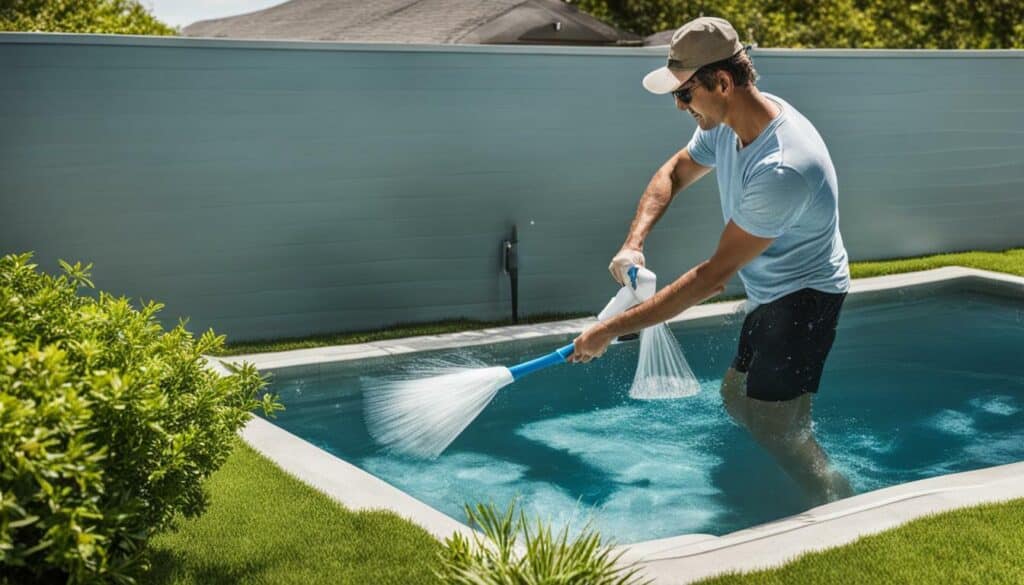
Fall Maintenance
As the temperatures begin to drop, it’s time to start preparing your pool for the off-season. Remove any debris that may have accumulated and adjust the water chemistry to ensure a proper balance. If necessary, add a winterizing chemical to help protect the pool from algae growth. Finally, cover the pool with a suitable cover to prevent debris from falling in during winter.
Winter Maintenance
During the winter months, it’s important to keep an eye on your covered pool. Remove any snow or debris from the cover to prevent it from tearing or collapsing. Check the pool chemistry occasionally to ensure a proper balance. If you live in an area with freezing temperatures, consider adding a freeze protector to prevent damage to the pool equipment.
By following these saltwater pool maintenance tips for each season, you can keep your pool in optimal condition and enjoy a safe swimming experience year-round.

Conclusion
Keeping a saltwater pool clean and properly maintained is essential for a safe and enjoyable swimming experience. By following the comprehensive guide we’ve provided, you can ensure your pool stays in top condition year-round.
Remember to regularly clean the pool’s surface, walls, and other areas to prevent the buildup of debris and maintain its pristine appearance. Properly balancing the chemical levels in the water is also crucial for water clarity and swimmer safety.
Be sure to also maintain your pool’s filtration system and have the essential equipment needed for proper saltwater pool maintenance. And don’t forget to troubleshoot common issues as they arise to keep your pool in optimal condition.
Lastly, it’s important to perform seasonal maintenance tasks to prepare your pool for winter and open it up for summer. With the right knowledge and tools, you can enjoy a clean and safe swimming experience in your saltwater pool for years to come.
FAQ
Q: How often should I clean my saltwater pool?
A: It is recommended to clean your saltwater pool at least once a week. This includes skimming the surface, brushing the walls, and vacuuming the pool floor. Regular cleaning will help maintain water clarity and prevent the buildup of debris.
Q: How do I balance the chemicals in my saltwater pool?
A: Balancing the chemicals in your saltwater pool is crucial for optimal water quality. Test the water regularly and adjust the pH, alkalinity, and sanitizer levels accordingly. Consult a professional or refer to the manufacturer’s guidelines for specific recommendations based on your pool’s size and usage.
Q: Can I use regular pool equipment for my saltwater pool?
A: While some regular pool equipment can be used for saltwater pools, it is recommended to invest in equipment specifically designed for saltwater use. Saltwater can be corrosive, so using compatible materials and components will help prolong the lifespan of your equipment and ensure efficient maintenance.
Q: How can I troubleshoot cloudy water in my saltwater pool?
A: Cloudy water in a saltwater pool could be a result of improper water balance, inadequate filtration, or high levels of organic matter. Test and adjust the water’s pH and sanitizer levels, clean or backwash the filter, and shock the pool if necessary. If the problem persists, consult a professional for further assistance.
Q: What should I do to prepare my saltwater pool for winter?
A: Winterizing your saltwater pool involves several steps. Lower the water level, clean and vacuum the pool, balance the chemicals, remove and store any removable equipment, and cover the pool securely. It is also advisable to consult a professional or follow the manufacturer’s instructions for specific winterization procedures.
Q: How often should I test the water in my saltwater pool?
A: Regular testing is essential for maintaining proper water balance in a saltwater pool. Test the water at least once a week using a reliable test kit. This will help you monitor the pH, alkalinity, and sanitizer levels and ensure that adjustments can be made promptly to maintain a healthy pool environment.


